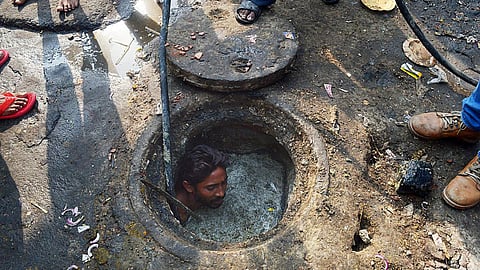
New Delhi- Advocates, journalists, and social activists have expressed concern over the alarming number of deaths due to manual scavenging within the last week. These deaths are a testimony that manual scavenging is still prevalent in this country even after a decade of the practice being banned. Today, the deaths due to manual scavenging go unacknowledged by the government authorities, who refuse to accept the crisis.
In a press conference held on 15th May at the Press Club of India, Indira Unninayar, a senior advocate, said that there is no proper data on the number of manual scavengers, and the government hugely suppresses the number of manual scavenging deaths.
Recently, Uttar Pradesh saw eight deaths due to manual scavenging within a short span of ten days. On 2nd May, Shroban Yadav, 57, and his son Sushil Yadav, 30, were killed while testing a sewer line in Lucknow’s Wazirganj area. On 3rd May, two daily wage workers, Kokan Mandal, 40, and Nooni Mandal, 36, were killed while cleaning the septic tank of a private residence in Noida Sector 26.
Soon after, on 9th May, four people died from inhaling toxic gases while cleaning the septic tank of a house in Mughalsarai, Chandauli. Three of the victims, Vinod Rawat, 35, Kundan, 42, and Loha, 23, were informal sanitation workers, while the fourth victim was the son of the house owner who died while trying to save the workers.
In October 2023, the Supreme Court ordered a compensation of 30 lakhs to the families of victims of manual scavenging, which has not reached any of the victims so far. Allegedly, the District Administration promised to provide only ₹4 lakh ex gratia to each deceased in the incident in Chandauli.
In India, the lives of workers are considered cheap and inexpensive, and they can only safeguard their rights through unionization, said Roma, a senior activist from the All India Union of Forest Working People.
In all of the incidents, the workers were informal labourers or contractual sanitation workers and were made to clean sewer/septic tanks without any supervision.
The sewer/septic tank workers are not provided with any safety equipment, and often they have to face the toxic gases with just a handkerchief, said Radhika Bordia, a senior journalist who has been covering these cases for the last 25 years.
Many workers are made to forcibly enter sewer/septic tanks by contracting agencies or private residents.
In one such incident, on 12th May, a housekeeping staff member, Hare Krishan Prasad, was forced to enter the sewer in D Mall, Rohini, Delhi, where he was killed due to inhalation of toxic gases. Colin Gonsalves, Senior Advocate of the Supreme Court, believes that the municipal authorities should be held responsible for the deaths of these workers and held accountable for these offenses, which are as serious as murder charges.
The local governance authorities have failed to fulfill the responsibility of supervising the cleaning in their jurisdiction and thus should be held liable for these deaths.
These deaths of sewer/septic tank workers are not new in this country, but these cases go unacknowledged by the government authorities and are suppressed by the police.
The speakers also pointed out that the poor condition of sewer and sanitation workers, who largely belong to marginalized caste groups, also shows the persistence of caste-based exploitation in India.
Manual scavenging is also a violation of Article 21 of the Constitution, which guarantees the right to live with dignity. The Prohibition of Employment as Manual Scavengers and their Rehabilitation Act, 2013, doubly reinforces this right by making manual scavenging an outlaw practice. However, even after a decade of its implementation, this caste-based practice continues to exist within the nation and take the lives of uncountable people.
The press conference was organized by Dalit Adivasi Shakti Adhikar Manch (DASAM) and Justice News in collaboration with the National Alliance of People’s Movement (NAPM), the National Campaign for Dignity and Rights of Sewerage and Allied Workers (NCDRSAW), the Sewerage and Allied Workers Forum (SSKM), the Delhi Solidarity Group (DSG), the Indian Sanitation Studies Collective (ISSC), and Vimarsh Media.
You can also join our WhatsApp group to get premium and selected news of The Mooknayak on WhatsApp. Click here to join the WhatsApp group.